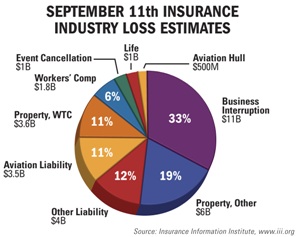NU Online News Service, May 2, 2:14 p.m. EDT
Demand for insurance to cover terrorism risk, and the appetite of commercial insurers to write it, could grow following the killing of Osama bin Laden by United States forces.
Robert Hartwig, president of the Insurance Information Institute, says the death of the Al Qaeda leader and mastermind behind the largest insured loss in insurance history until Hurricane Katrina may "increase the realization that the threat was elevated" even before Sunday's news that operatives cornered and killed bin Laden in Pakistan.
"While everyone hopes this will reduce the threat," Hartwig says, "we are now being told that there is actually an enhanced potential."
The U.S. State Department warned today about the added chance of anti-American violence following bin Laden's death.
 Simultaneously, the insurance industry—which once excluded terrorism risk from commercial policies after 9/11—could eventually find a new confidence to write in the most at-risk areas now that bin Laden is gone.
Simultaneously, the insurance industry—which once excluded terrorism risk from commercial policies after 9/11—could eventually find a new confidence to write in the most at-risk areas now that bin Laden is gone.
"It depends on the perception of this event, whether there is an increase in the willingness to write from property and casualty insurers and reinsurers," says Hartwig, who co-authored a report with Claire Wilkinson, vice president of Global Issues at the I.I.I., released last month.
While one can speculate on the impact bin Laden's death will have on the commercial-insurance industry, "no interpretation can conclude the Terrorism Risk Insurance Act [TRIA] is obsolete. That would be a mistake," Hartwig continues.
Commercial coverage of terrorism risk after 9/11 only returned when Congress enacted TRIA late in 2002.
"The industry is generally satisfied, it is a successful program, and it costs taxpayers nothing," Hartwig says.
Nevertheless, TRIA, which established a partnership that allows the federal government and the insurance industry to share losses in the event of a major terrorist attack, has been heavily scrutinized. According to the I.I.I. report, President Obama's budget plans included a scaling-back of support for the program, now called TRIPRA after the Terrorism Risk Insurance Program Reauthorization Act of 2007 extended the program for the second time.
The industry will have time to assess the affect bin Laden's death has on the frequency of global terrorist attacks. TRIPRA does not expire until 2014.
Want to continue reading?
Become a Free PropertyCasualty360 Digital Reader
Your access to unlimited PropertyCasualty360 content isn’t changing.
Once you are an ALM digital member, you’ll receive:
- Breaking insurance news and analysis, on-site and via our newsletters and custom alerts
- Weekly Insurance Speak podcast featuring exclusive interviews with industry leaders
- Educational webcasts, white papers, and ebooks from industry thought leaders
- Critical converage of the employee benefits and financial advisory markets on our other ALM sites, BenefitsPRO and ThinkAdvisor
Already have an account? Sign In Now
© 2024 ALM Global, LLC, All Rights Reserved. Request academic re-use from www.copyright.com. All other uses, submit a request to [email protected]. For more information visit Asset & Logo Licensing.








